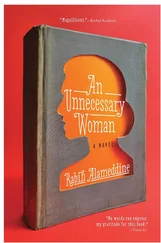
When my father divorced my mother and sent her back to America, she put a curse on our house from which none of us escaped. Everyone misunderstood, thinking it was a curse ending my father’s line. The end of my father’s name could have been a result, but it was primarily a side effect. The curse was a life of loneliness. If you took all eight of us, the parents and the six siblings, scrutinized our hearts, you would come across a loneliness so enveloping, so overwhelming, it frightens the uninitiated.
My family’s leitmotif is loneliness. We exhibit characteristics of the curse differently, deal with it differently. We have different forms of loneliness. However, whether we are in a relationship, whether we are surrounded by close friends, we are never separated from it.
On September 13, 1997, I received a call from my stepmother, Saniya, at two in the morning. Groggily, I tried to make sense of what she was saying. I should fly to Beirut as soon as possible and bring my half-brother, Ramzi, with me. We were needed. I asked if my father was all right. My father was doing well under the circumstances. My sister Lamia was in trouble. What kind of trouble? I asked. She would not elaborate. Emotional problems of some sort. Her husband was fine, her children were fine. But we should fly to Beirut the next day. It was important. I asked to speak to my father. He was with Lamia.
Sleep was impossible. I called the airlines and made reservations for Ramzi and me, without consulting him. I did not wish to wake him, but then I had to because the flight was at eight in the morning. He needed time to pack. I called his house and Peter, his lover, answered.
“Do you know what time it is?” he hissed into the phone. “It’s three-thirty in the morning. You shouldn’t be calling at this hour.”
“I have to speak to Ramzi, Peter. Please put him on.”
I heard Peter say, “It’s your crazy sister.”
In the background, “Sarah?”
Ramzi came on the phone, alert, “What’s the matter?”
“Lamia.”
Lamia is the sister closest to me in age, two years older, yet the farthest in temperament. She was awfully shy, neurotically so, and so homely — elephantine nose, wide brows, bulging eyes, and pitted skin that looked like it needed a good scouring — that even at an early age my stepmother worried Lamia would grow up to be a spinster. She did not. Lamia married a low-level insurance salesman with the personality of a sheet of plywood. Surprisingly, she made something out of her life. When the war got heavier, she and her family moved to Cairo, where she studied nursing. When she moved back to Beirut, she lived with her in-laws, worked at a hospital, and continued her bland existence.
We did not get along. She was not close to me in any way, but I did not hate or despise her. I believe she hated me and always felt inferior, or at least, I can say, she was filled with envy. I usually spent the entire month of May in Beirut. She was always the last to come visit, after a whole week had passed, enough time for it to be an insult, but not enough to be considered an egregious one.
Peter and Ramzi picked me up. Even though Peter did not apologize for his behavior earlier, he seemed contrite. I had gotten used to him and his bitchiness, so it was not that big of a deal. He is a good person who is easily lost when people do not follow his rules. “Do you have any idea what this is about?” he asked me as he started the car.
“No,” I replied, “I wish I knew more. All I was told was that Lamia is having some kind of emotional problem.”
“Probably having a nervous breakdown,” added Ramzi. “Not rare in our family.” The last comment was for Peter’s benefit. I did not need a reminder, of course. “If I were living with her husband and in-laws,” Ramzi went on, “I’d have a nervous breakdown for sure.”
“Did you pack everything?” I asked Ramzi. A stupid question; not only would he have packed everything, Peter would have checked up on him. They would have gone over their list of things at least twenty times, shirts, sweaters, pants, socks, brown and black tassled moccasins, immersion heaters, inflatable hangers, and herbal teabags. Ever since he was a boy, Ramzi had been meticulous. Whenever we went to the beach, he wore a tight Speedo and his penis always pointed upward. To this day, whenever I see him in a bathing suit, his penis is never pointing left or right, always up. Peter was just as anal. They actually glued the strands of tinsel on the Christmas tree so they would not move or fall down. They feared ever finding themselves at the mercy of the random, dreaded the disturbing effect of arbitrariness. No one would be able to guess Ramzi and I are related. My apartment looks like a hurricane went through it, his is ready for a photo spread in House and Garden. They cooked salmon soufflés that never, ever, collapsed for Princess, their white Persian cat. They made a perfect couple — too perfect, for they were carbon copies, exact replicas, never challenging, never arguing, never having to allow the other within the boundaries of their erected walls, a relationship based on mutual convenience, complementary neuroses, and loneliness.
“Do you have any idea how long you’ll be?” Peter was probably considering what to say when he called UCSF, where Ramzi was interning, how he would explain: Dr. Ramzi Nour el-Din had to fly back to Lebanon because his half-sister flipped.
Lamia is the middle sister, and I doubt she ever forgave God for that misplacement. She was envious both of Amal for simply being the eldest and getting all the attention and of me for being special. She was a taciturn child, though not exactly peaceful. She always got me in trouble. The only severe beating I ever received from my father was because of her. My stepmother, always trying to impress my father, made sachets of dried lavender flowers stuffed into old mosquito nettings, which she placed between clean sheets in the closet. One day, I took out all the bags and placed them in the litter box. I replaced them the next day among the sheets.
“Who did this?” my stepmother screamed over and over.
By that time, I had perfected a look of utter innocence. No one suspected such an angelic face. My stepmother called us all into the room, even my father. “Who did this?”
Lamia, as calm as can be, pointed at me. “Sarah did. I saw her do it.”
I wanted to kill her. She lied. She did not see. She was not in the house when I did my deed. “She’s lying,” I said. “She didn’t see me. I didn’t do it.”
“She did it. I saw her do it with my own two eyes. I swear on my mother she did it.”
Before I could jump her and commit fratricide, my father lifted me by the collar and dragged me to the bathroom. He took off his belt and whipped me so hard the welts lasted for two weeks. After the beating, she still would not recant, insisting she saw me do it. No matter how much I argued, she did not budge from her invented story.
We had a six-hour layover at Charles DeGaulle Airport. We tried calling Beirut, our parents’ house, Amal’s house, everyone, but no one answered. I left Ramzi, who was using his laptop, and went to look at the duty-free stores, window-shopping diversion. While looking at the window display of the Hermès store, I heard my name being paged. I picked up the courtesy phone only to hear Ramzi yelling, “Come back, come back.” I ran back to him. He was fluttering nervously, his face red as a beet, palm hitting forehead every ten seconds. “Not possible. Not possible.” I panicked even more. He was prattling in Arabic, not his preferred language. I took the laptop, the object of his mortification, stared at the screen, and my mouth dropped. He had used his wireless modem to connect to the AP wire. One of ours had made the news.
Читать дальше













